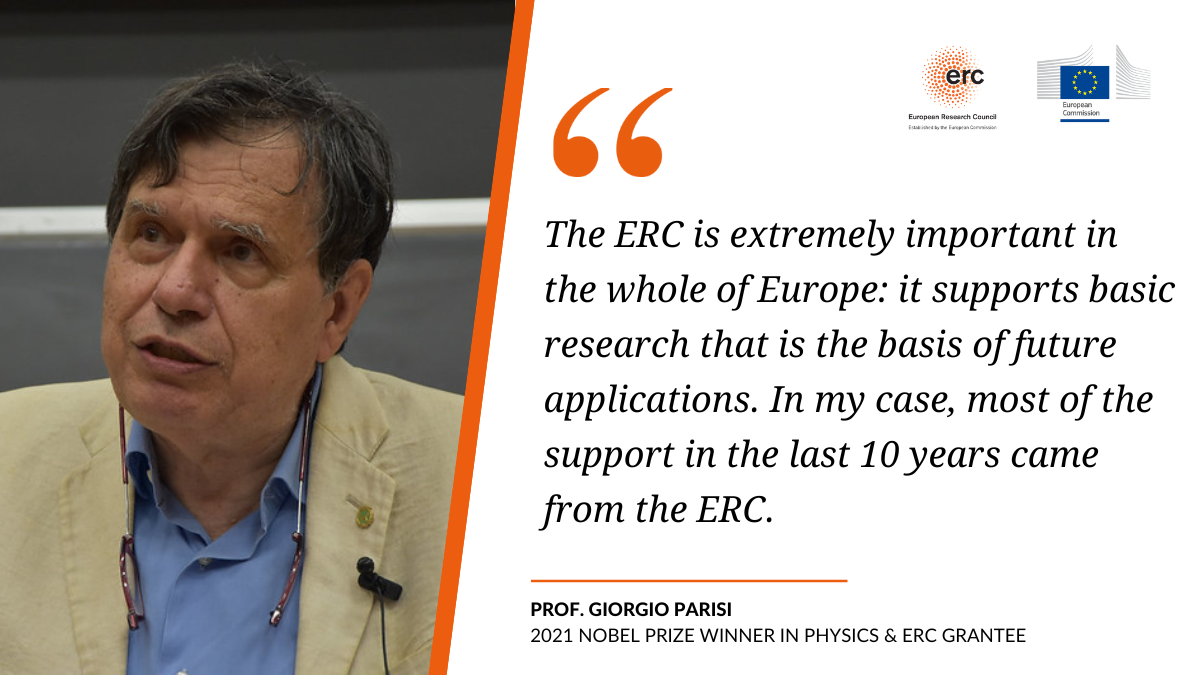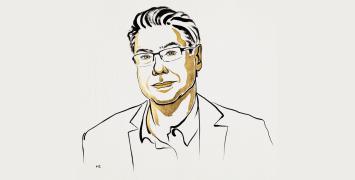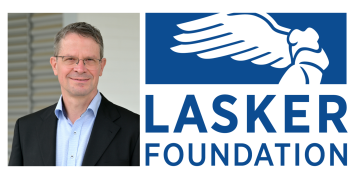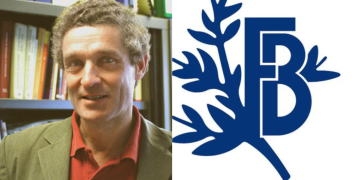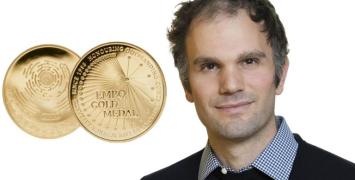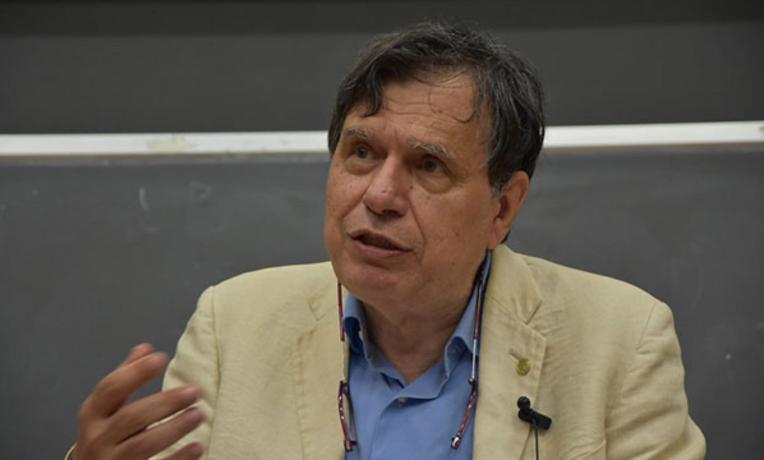
Giorgio Parisi, grantee of the European Research Council (ERC), has been awarded the 2021 Nobel Prize in Physics. The other half of this year’s award is shared by Syukuro Manabe and Klaus Hasselmann. The three laureates received the prize “for ground-breaking contributions to our understanding of complex physical systems.” For almost a decade, Professor Parisi has been supported with substantial individual funding from the ERC, worth in total some €3.7 million. Klaus Hasselmann has participated in two EU-funded Framework Programme 7 projects.
Commissioner for Innovation, Research, Culture, Education and Youth Mariya Gabriel said: "I warmly congratulate all three laureates of this year’s Nobel Prize in Physics for their achievement. I am proud that the EU has backed two of them, Klaus Hasselmann and Giorgio Parisi, through research and innovation funding aimed at advancing scientific knowledge. This shows us that investing in top frontier science helps to keep European research at the forefront.”
Incoming ERC President Prof. Maria Leptin commented: "Congratulations to today’s Nobel Prize winners! The European Research Council is proud to have supported Giorgio Parisi and his revolutionary research since 2010. He is the eighth ERC grantee to be awarded a Nobel Prize since the EU launched the ERC in 2007 to ensure that the brightest minds could follow their most daring scientific ideas. I cannot underline enough how crucial it is for Europe to keep investing in top researchers driven by sheer curiosity, which Giorgio Parisi’s achievement illustrates perfectly.”
To date, Prof. Parisi has received two Advanced Grants from the ERC, in 2009 and 2016, worth in total some 3.7 million euro. Using his first ERC grant (worth €2 million), he aimed to get a theoretical understanding of the most important large-scale phenomena in classical and quantum disordered systems.
With his current ongoing Advanced Grant (worth €1.7 million), Prof. Parisi develops a theory of the large-scale properties of the free energy landscape of glasses at low temperature. With focus on the jamming of hard spheres, the aim is to study properties of phase transitions with general applicability, especially in the context of complex systems.
He won the Nobel Prize for discovering the “interplay of disorder and fluctuations in physical systems from atomic to planetary.”
Prof. Parisi has also served as a panel member for the ERC evaluations several years, reviewing grant proposals from early and mid-career researchers.
Klaus Hasselmann has participated in two EU-funded projects (EURUCAS and COMPLEX) from the EU’s Framework Programme 7.
Background
Giorgio Parisi is Professor of theoretical physics at the University of Roma I, ‘‘La Sapienza,’’ and his research subjects cover quantum field theory, statistical mechanics, and complex systems. His discoveries are among the most important contributions to the theory of complex systems. They make it possible to understand and describe many different and apparently entirely random materials and phenomena, not only in physics but also in other, very different areas, such as mathematics, biology, neuroscience and machine learning.
Giorgio Parisi has previously also won the Wolf’s Prize.
Today's award follows that of seven other ERC grantees:
- Prof. Konstantin Novoselov was the first ERC grantee to receive a Nobel Prize in Physics for his work on graphene. He held a Starting Grant and in 2010 was amongst the youngest Nobel prize winners in history.
- Prof. Serge Haroche, ERC Advanced Grant holder, was awarded the 2012 Nobel Prize in Physics for ground-breaking experimental methods that enable measuring and manipulation of individual quantum systems.
- Professors Edvard I. Moser and May-Britt Moser, both ERC Advanced Grant holders, received the 2014 Nobel Prize in Physiology or Medicine for their discoveries of cells that constitute a positioning system in the brain.
- Prof. Jean Tirole, ERC Advanced Grant holder, received the 2014 Sveriges Riksbank Prize in Economic Sciences in Memory of Alfred Nobel for his work on examining competition, analysing how large companies should be regulated to prevent monopoly behaviour and protect consumers.
- Prof. Bernard Feringa, ERC Advanced Grant holder, received the 2016 Nobel Prize in Chemistry for the design and synthesis of molecular machines.
- Prof Peter J. Ratcliffe, ERC Advanced Grant holder, received the 2016 Nobel Prize in Physiology or Medicine “for their discoveries of how cells sense and adapt to oxygen availability.”
In addition, the ERC has funded several researchers who were already Nobel Prize laureates when they won their ERC grants.
About the ERC
The ERC, set up by the European Union in 2007, is the premier European funding organisation for excellent frontier research. It funds creative researchers of any nationality and age, to run projects based across Europe. The ERC offers four core grant schemes: Starting Grants, Consolidator Grants, Advanced Grants and Synergy Grants. With its additional Proof of Concept Grant scheme, the ERC helps grantees to bridge the gap between their pioneering research and early phases of its commercialisation.
The ERC is led by an independent governing body, the Scientific Council, and the ERC President. Jean-Pierre Bourguignon was President on an interim basis from 27 July 2020 until 31 August 2021. Maria Leptin will take office 1 November 2021. The overall ERC budget from 2021 to 2027 is more than €16 billion, as part of the Horizon Europe programme, under the responsibility of the European Commissioner for Innovation, Research, Culture, Education and Youth, Mariya Gabriel.

